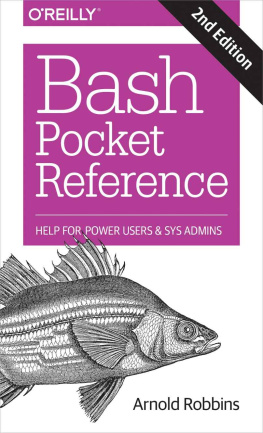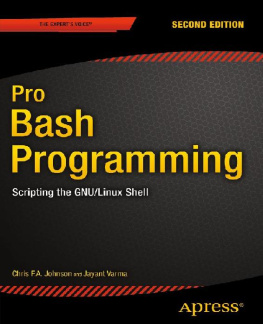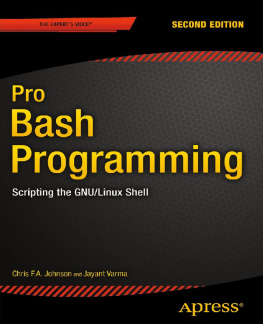Robbins - Bash Pocket Reference
Here you can read online Robbins - Bash Pocket Reference full text of the book (entire story) in english for free. Download pdf and epub, get meaning, cover and reviews about this ebook. City: Beijing, year: 2016, publisher: OReilly Media, genre: Computer. Description of the work, (preface) as well as reviews are available. Best literature library LitArk.com created for fans of good reading and offers a wide selection of genres:
Romance novel
Science fiction
Adventure
Detective
Science
History
Home and family
Prose
Art
Politics
Computer
Non-fiction
Religion
Business
Children
Humor
Choose a favorite category and find really read worthwhile books. Enjoy immersion in the world of imagination, feel the emotions of the characters or learn something new for yourself, make an fascinating discovery.
Bash Pocket Reference: summary, description and annotation
We offer to read an annotation, description, summary or preface (depends on what the author of the book "Bash Pocket Reference" wrote himself). If you haven't found the necessary information about the book — write in the comments, we will try to find it.
Its simple: if you want to interact deeply with Mac OS X, Linux, and other Unix-like systems, you need to know how to work with the Bash shell. This concise little book puts all of the essential information about Bash right at your fingertips.
Youll quickly find answers to the annoying questions that generally come up when youre writing shell scripts: What characters do you need to quote? How do you get variable substitution to do exactly what you want? How do you use arrays? Updated for Bash version 4.4, this book has the answers to these and other problems in a format that makes browsing quick and easy.
Topics include:
Robbins: author's other books
Who wrote Bash Pocket Reference? Find out the surname, the name of the author of the book and a list of all author's works by series.










![Cameron Newham [Cameron Newham] - Learning the bash Shell, 3rd Edition](/uploads/posts/book/119671/thumbs/cameron-newham-cameron-newham-learning-the-bash.jpg)
![Chris F.A. Johnson [Chris F.A. Johnson] - Pro Bash Programming: Scripting the GNU/Linux Shell](/uploads/posts/book/119669/thumbs/chris-f-a-johnson-chris-f-a-johnson-pro-bash.jpg)

